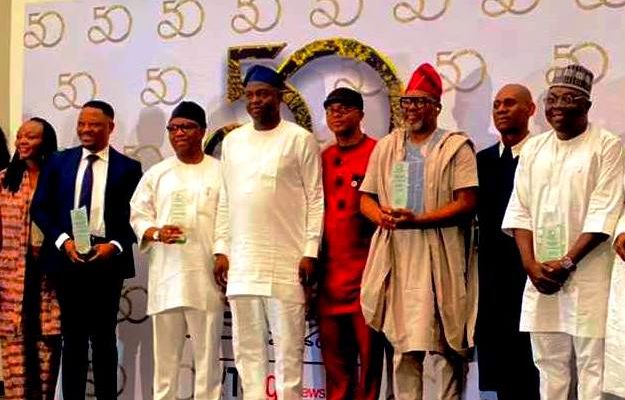By Tosin Olabode
Prof. Nentawe Goshwe Yilwatda, a prominent scholar and politician, has outlined crucial steps for Nigeria to fully capitalize on the opportunities presented by the digital economy and the Fourth Industrial Revolution (4IR). Speaking at the recent ‘50 Most Valuable Personalities in Nigeria’s Digital Economy Conference & Award’ held in Lagos, Prof. Yilwatda emphasized the need for robust policies and infrastructure to harness the potential of emerging technologies for the benefit of the nation, particularly its youth demographic, which constitutes over 60% of the population.
RELATED: EXECUTINE NOTES: Nigeria’s digital economy and opportunities for young people
Highlighting the transformative potential of the Fourth Industrial Revolution, Prof. Yilwatda underscored the importance of leveraging technologies such as the Internet of Things, machine learning, artificial intelligence, and robotics to revolutionize various sectors of the economy, including agriculture, healthcare, manufacturing, and security.
He said “the Fourth Industrial Revolution presents a transformative opportunity for Nigeria to harness the power of emerging technologies such as the Internet of Things, machine learning, artificial intelligence, and robotics to revolutionize various sectors, from agriculture and healthcare to manufacturing and security
Addressing an audience of CEOs in Nigeria’s ICT/Telecom sector, regulators, and other stakeholders, Yilwatda outlined seven steps crucial to optimizing existing and emerging opportunities in the digital economy. These include educational reforms to focus on new skills and career pathways more relevant to today’s economies; opening access to financing to allow young and innovative entrepreneurs to overcome funding barriers; prioritizing supportive policies and regulatory frameworks to foster and not hinder innovation and entrepreneurship.
Others are investing to address infrastructural challenges to improve internet connectivity, scale up bandwidth and reducing data costs, particularly in rural areas; healthy cybersecurity measures and data protection frameworks to safeguard individuals, businesses, and the broader digital ecosystem from cyber threats and data breaches.
Equally important is the need to build strong partnerships and collaborations between stakeholders to nurture a vibrant digital ecosystem aligned with the Fourth Industrial Revolution. These partnerships include between the government, private sector, academic institutions, civil society organizations, and international organizations.
7 Enabling Factors for Creating Digital Opportunities for Young People in Nigeria – Yilwatda
- Digital Literacy and Skill Development: Equipping Nigeria’s youth with relevant digital skills is crucial. This includes not only traditional skills like coding, data analysis, and cybersecurity but also emerging skills in areas like artificial intelligence, machine learning, robotics, and the Internet of Things. Educational reforms, vocational training programs, and partnerships between academic institutions and the private sector can facilitate this skill development. Initiatives like coding boot camps, online learning platforms, and industry-led training programs can also play a role in upskilling the youth.
- Access to Funding and Investment: Access to financing is often a major barrier for young entrepreneurs and startups, particularly those working in emerging technologies and the Fourth Industrial Revolution space. The government, private sector, and international organizations should collaborate to establish venture capital funds, angel investor networks, and other funding mechanisms tailored to the digital economy. Additionally, providing training on pitching, business planning, and investment readiness can help young entrepreneurs secure funding for their innovative ideas.
- Supportive Policies and Regulatory Frameworks: The Nigerian government should prioritize developing supportive policies and regulatory frameworks that foster innovation and entrepreneurship in the digital space, particularly in the context of the Fourth Industrial Revolution. This includes reducing barriers to entry, providing tax incentives, addressing intellectual property concerns, and creating a conducive environment for digital businesses to thrive.
- Collaboration and Partnerships: Building strong partnerships and collaborations between stakeholders is essential for nurturing a vibrant digital ecosystem aligned with the Fourth Industrial Revolution. This includes partnerships between the government, private sector, academic institutions, civil society organizations, and international organizations. Such collaborations can facilitate knowledge sharing, resource pooling, joint research and development initiatives, and the creation of synergies that benefit the digital economy.
- Promoting Digital Entrepreneurship and Innovation: Initiatives that promote digital entrepreneurship and innovation should be encouraged, with a particular focus on emerging technologies and the Fourth Industrial Revolution. This can include setting up startup incubators and accelerators, organizing hackathons and competitions, providing mentorship and training programs for aspiring digital entrepreneurs, and fostering a culture of innovation within academic institutions and the private sector.
- Infrastructure Development: Addressing infrastructural challenges, such as improving internet connectivity, increasing bandwidth, and reducing data costs, particularly in rural areas, is crucial for enabling widespread digital adoption, economic inclusion, and the successful integration of Fourth Industrial Revolution technologies.
- Cybersecurity and Data Protection: As Nigeria’s digital economy grows and adopts advanced technologies like the Internet of Things, artificial intelligence, and machine learning, robust cybersecurity measures and data protection frameworks must be implemented to safeguard individuals, businesses, and the broader digital ecosystem from cyber threats and data breaches.
Pre-launch of National Data Protection Awareness Campaign
The event also featured the pre-launch of a national awareness campaign on data protection by Dr. Vincent Olatunji, National Commissioner/CEO of the Nigeria Data Protection Commission (NDPC).
Dr. Olatunji emphasized the fundamental role of data protection in a thriving digital economy, underscoring the importance of safeguarding individuals and businesses from cyber threats and data breaches.
Sani Ahmed Yaro, Zonal Coordinator of the Nigerian Stakeholders for Data Protection Awareness (NSDPA), outlined plans for a national campaign to deepen awareness and compliance with data privacy regulations across the country. The National Data Protection Awareness Campaign is anchored by the NSDPA. “The NSDPA is focusing on driving the agenda for awareness to deepen compliance level across the country,” said Yaro who was represented by Delmwa Gogwim, a senior executive of the group.
Ivan Anya, Chairman of the Association of Licensed Data Protection Organisations of Nigeria (ALDAPCON), emphasized the importance of awareness in enhancing the effectiveness of licensed data protection organizations.
Digital Economy: Debunking myths, highlighting opportunities for shared prosperity
In another presentation: ‘Myths and Realities of Nigerian Digital Economy,’ Ike Nnamani, CEO of Digital Realty Nigeria, challenged policymakers and stakeholders to invest more in the digital economy, debunking myths and highlighting the opportunities for progress and shared prosperity.
The ’50 Most Valuable Personalities in Nigeria’s Digital Economy Conference & Award’ serves as a crucial platform to address sectoral challenges, honour industry pioneers, and recognize individuals driving digital innovation in Nigeria, as noted by Olusegun Oruame, Founder of IT Edge News.Africa, the event organizer.




























